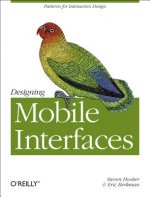
Kod: 02443307
Socio-technical Design of Ubiquitous Computing Systems
Autor Klaus David, Kurt Geihs, Jan Marco Leimeister, Alexander Roßnagel
By using various data inputs, ubiquitous computing systems detect their current usage context, automatically adapt their services to the user s situational needs and interact with other services or resources in their environment o ... więcej
- Język:
 Angielski
Angielski - Oprawa: Twarda
- Liczba stron: 353
Wydawca: Springer International Publishing AG, 2014
- Więcej informacji o książce

Zobacz książki o podobnej tematyce
-

Milk and Honey
47.49 zł -12 % -

Augustus
70.04 zł -23 % -

A Game of Thrones: The Story Continues
313.38 zł -14 % -

Higurashi When They Cry: Massacre Arc, Vol. 2
94.30 zł -

Let it Snow
31.26 zł -26 % -

Irish Fairy Tales
19.83 zł -23 % -

Messenger
37.57 zł -26 % -

Messi
91.39 zł -

Apollo 11
112.24 zł -

Fashion and Armour in Renaissance Europe
155.43 zł -

Not Gay
154.43 zł -

Football For Dummies (UK Edition)
127.57 zł -

Quilt A Gift For Little Ones
74.45 zł -23 % -

Atlas of Lymph Node Pathology
1519.76 zł
Podaruj tę książkę jeszcze dziś
- Zamów książkę i wybierz "Wyślij jako prezent".
- Natychmiast wyślemy Ci bon podarunkowy, który możesz przekazać adresatowi prezentu.
- Książka zostanie wysłana do adresata, a Ty o nic nie musisz się martwić.
Więcej informacji o Socio-technical Design of Ubiquitous Computing Systems
Za ten zakup dostaniesz 144 punkty
 Opis
Opis
By using various data inputs, ubiquitous computing systems detect their current usage context, automatically adapt their services to the user s situational needs and interact with other services or resources in their environment on an ad-hoc basis.§Designing such self-adaptive, context-aware knowledge processing systems is, in itself, a formidable challenge. This book presents core findings from the VENUS project at the Interdisciplinary Research Center for Information System Design (ITeG) at Kassel University, where researchers from different fields, such as computer science, information systems, human-computer interaction and law, together seek to find general principles and guidelines for the design of socially aware ubiquitous computing systems. To this end, system usability, user trust in the technology and adherence to privacy laws and regulations were treated as particularly important criteria in the context of socio-technical system design.§During the project, a comprehensive blueprint for systematic, interdisciplinary software development was developed, covering the particular functional and non-functional design aspects of ubiquitous computing at the interface between technology and human beings. The organization of the book reflects the structure of the VENUS work program. After an introductory part I, part II provides the groundwork for VENUS by presenting foundational results from all four disciplines involved. Subsequently, part III focuses on methodological research funneling the development activities into a common framework. Part IV then covers the design of the demonstrators that were built in order to develop and evaluate the VENUS method. Finally, part V is dedicated to the evaluation phase to assess the user acceptance of the new approach and applications.§The presented findings are especially important for researchers in computer science, information systems, and human-computer interaction, but also for everyone working on the acceptance of new technologies in society in general.§
 Szczegóły książki
Szczegóły książki
Kategoria Książki po angielsku Computing & information technology Computer science Human-computer interaction
245.63 zł
- Pełny tytuł: Socio-technical Design of Ubiquitous Computing Systems
- Autor: Klaus David, Kurt Geihs, Jan Marco Leimeister, Alexander Roßnagel
- Język:
 Angielski
Angielski - Oprawa: Twarda
- Liczba stron: 353
- EAN: 9783319050430
- ISBN: 3319050435
- ID: 02443307
- Wydawca: Springer International Publishing AG
- Waga: 6682 g
- Wymiary: 235 × 155 × 25 mm
- Data wydania: 29. July 2014
Ulubione w innej kategorii
-

This is Service Design Doing
200.33 zł -11 % -

Don't Make Me Think, Revisited
184.60 zł -5 % -

About Face - The Essentials of Interaction Design, 4e
237.72 zł -11 % -

Rocket Surgery Made Easy
184.60 zł -5 % -

Mapping Experiences
220.18 zł -5 % -

Quantifying the User Experience
234.31 zł -

Microinteractions: Full Color Edition
158.64 zł -5 % -

Simple and Usable Web, Mobile, and Interaction Design
163.05 zł -11 % -

UX Book
379.63 zł -

Bottlenecks
184.60 zł -5 % -

Calm Technology
105.02 zł -4 % -

Information Visualization
341.05 zł -

Interaction Design: Beyond Human-Computer Interaction, Fifth Edition
388.85 zł -

Data Structures & Algorithms Interview Questions You'll Most Likely Be Asked
158.64 zł -5 % -

Practical UX Design
210.57 zł -

Forms that Work
317.79 zł -

Bootstrap
103.62 zł -

Usable Usability - Simple Steps for Making Stuff Better
163.05 zł -11 % -

UX Strategy
200.33 zł -11 % -

Practical Tableau
297.35 zł -

UI UX Design
303.36 zł -

Information Architecture, 4e
256.36 zł -10 % -

Evil by Design - Interaction design to lead us into temptation
163.05 zł -11 % -

Art of Borderlands 3
184.60 zł -5 % -

Interview Techniques for UX Practitioners
120.76 zł -

Cognitive Biases in Visualizations
558.63 zł -16 % -

Designing with Data
200.33 zł -11 % -

Tao of Microservices
227.80 zł -5 % -

Complex Network Analysis in Python
187.71 zł -

Designed for Use 2e
190.81 zł -

Mobile User Experience
189.11 zł -9 % -

Neural Circuits and Networks, 1
561.74 zł -

OPC Unified Architecture
358.48 zł -

Introduction to Parallel Processing
1116.26 zł -

Microsoft Power BI Cookbook
312.68 zł -

Researching UX: User Research
168.86 zł -

Designing Mobile Interfaces
196.93 zł -5 % -

Universal UX Design
334.03 zł -

Introducing Ethereum and Solidity
302.46 zł -8 % -

Human-Computer Interaction
478.85 zł -

Tragic Design
158.64 zł -5 % -

RxJava for Android Developers
140.40 zł -34 % -

Augmented Reality in public spaces. Basic Techniques for video mapping
189.41 zł -

Security of Industrial Control Systems and Cyber Physical Systems
284.32 zł -

UX for the Web
210.56 zł -

Auditing and GRC Automation in SAP
1113.96 zł -

Guide to TCP/IP
451.39 zł -

Modular Design Frameworks
183.60 zł -

Artificial Intelligence and Games
198.83 zł
zadowolonych klientów
Od roku 2008 obsłużyliśmy wielu miłośników książek, ale dla nas każdy był tym wyjątkowym.
Copyright! ©2008-24 libristo.pl Wszelkie prawa zastrzeżonePrywatnieCookies



 21 milionów książek
21 milionów książek Dostawa 10.99 zł
Dostawa 10.99 zł (32) 444 93 66 (8-15.30h)
(32) 444 93 66 (8-15.30h)